Why Democrats will Lose the House
Voters indicate that the Democratic Party favors the interests of the wealthy and highly educated and that's a losing formula
From 1933 to 1995, a period of 62 years, Democrats held the majority in the U.S. House of Representatives in all but four of those years, including a 40-year stretch from 1955 to 1995. If Republicans win the House next week, as they are currently expected, they will have the majority for 22 of the 30 years from 1995 to 2025. The Senate, once likened by George Washington to a saucer used to cool the “hot tea” sent over from the House, has historically been more closely contested.
These longer-term patterns, well studied and understood by political scientists, help us to understand that there are deep currents in U.S. politics that help to explain the rise and fall of political parties and occasional political realignments. Expectations that Democrats will lose control of the House (and maybe also the Senate) next week involve much more than simply a repeat of the longstanding pattern of the President’s party losing seats in midterm elections, as you can see below.

The electoral dynamics of mid-term congressional elections are quite different from years in which there are Presidential elections. In this post I share some thoughts on why we appear to be in an era of Republican dominance of the House, and why that dominance looks well-positioned to continue.
First, a quick note about my own politics to help calibrate what you read below. Near the end of the Democrats long rule of the House in the 1990s, I worked for Congressman George Brown (D-CA). In presidential elections since 1988, I’ve voted for Democrats for president, with two exceptions, Jesse Jackson in 1988 and Ralph Nader in 2000. I’ve also been continuously registered as unaffiliated. I’d very much like to see Democrats do well, but first they are going to have to do better. Let’s get to it.
The core problem facing Democrats, in my view, is that they have become a party of the wealthy and the highly educated. This is not my opinion, nor is it based on any analysis of what particular Democrats say or what policies they support. This view is based entirely on how people actually vote. And those votes indicate that the wealthy and highly educated prefer Democrats and everyone else prefers Republicans.
The figure below, from Bloomberg Government, shows the distribution of current House seats based on the median income in each congressional district. Wealthy districts with median household incomes of greater than $86,000 per year are represented overwhelmingly by Democrats — 56 to 11. In less wealthy congressional districts, those with less than $58,000 in median income, the ratio favors Republicans 85 to 62.
We see something similar in terms of educational attainment. The figure below shows that Democrats hold an incredible 31 of 33 seats among congressional districts where a majority of the population has a bachelor’s degree. In those districts where less than 30% of residents hold bachelor’s degrees, Republicans hold 121 of 198 seats.
There’s one other aspect of the data in the two figures above that I want you to take note of — it is absolutely central — and that is the total number of districts in each category. There are 67 congressional districts where median incomes is greater than $86,000, but 147 where it is less than $58,000. Similarly, there are 33 districts that have a majority of residents with bachelor’s degree but 198 where that number is less than 30%. There are a lot more congressional districts in the United States with less wealthy and less educated people, than more.
The fact that Democrats have increasingly become a party of the wealthy and highly educated is not a new observation. For instance, at the New York Times, Nate Cohn sought last year to explain the reasons behind the trend, and yesterday Thomas Edsall also gave it a go. More broadly, economist Thomas Piketty and colleagues are among scholars who have noted that a growing left-right split across levels of educational attainment found in many nations in recent decades. And in a series of perceptive commentaries, political Ruy Teixeira has explored the origins and consequences of the Democrats embrace of the values and positions of the highly educated.
The basic problem here for Democrats is simple electoral math. There are a lot more voters who do not have college degrees than do, and while that may change in the future, that is not the political world of today.
Let’s take a look at some additional data to further understand the underlying dynamics.
The pie chart below shows the overall proportion of U.S. citizens with and without a college degree. There are about 89 million with a degree and about 160 million, almost twice as many, without. Americans without a college degree will continue to be in the majority for many years to come.
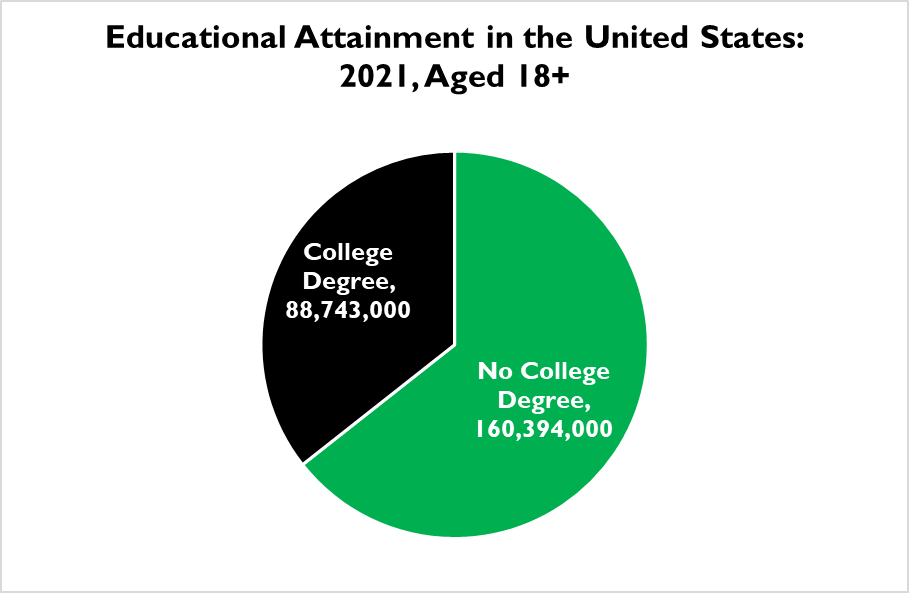
Of course, not everyone votes. The pie chart below shows who voted in the 2020 U.S. election. These data show that even as those with a college degree vote in higher proportions than those without, the ratio is still large, with almost 30 million more voters with no college degree versus those with a degree.
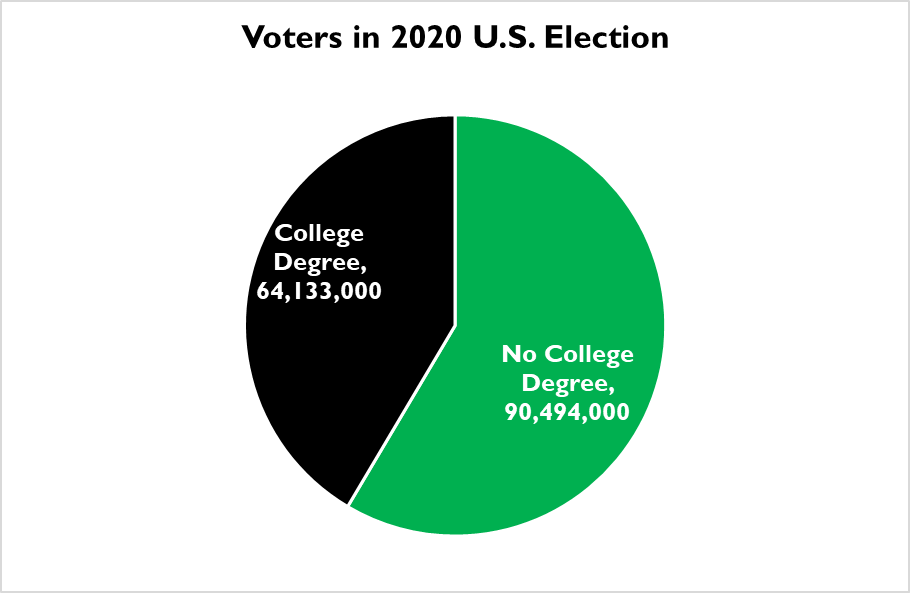
Let’s next look at how people voted in 2020, by educational attainment. The figure below, using data from the Pew Research Center, shows that in 2020 a majority of people with bachelor’s degree voted for Joe Biden, but less than 50% of those without a bachelor’s degree did not. In fact there is a pronounced relationship between educational attainment and the Biden vote share. These data are not unique and a wide range of analyses show a pronounced difference in support for Democrats by level of educational attainment.
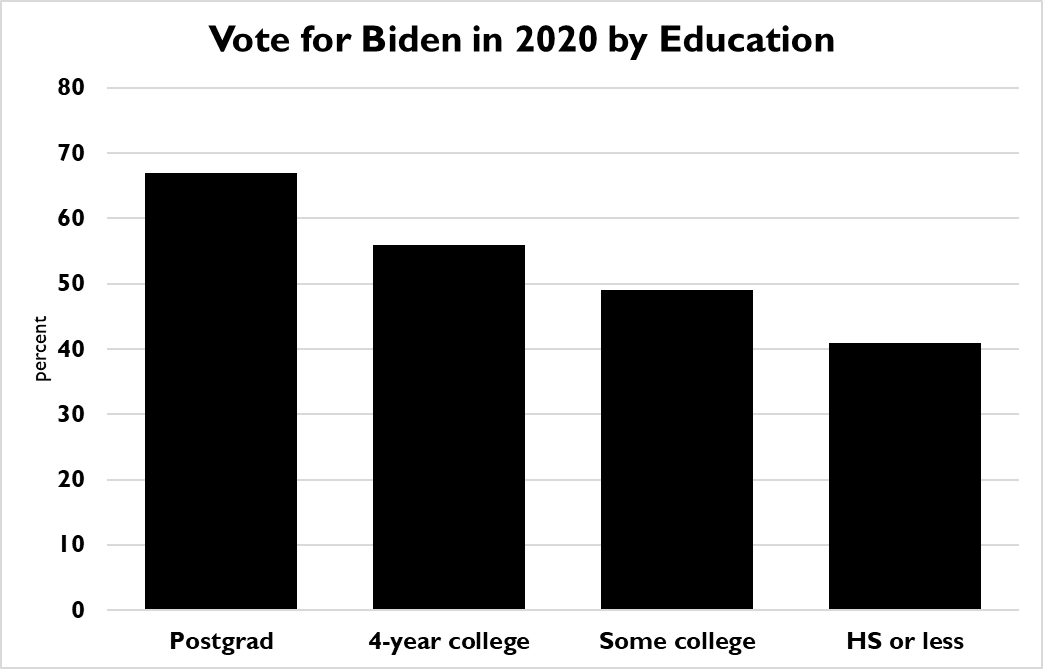
The math here is not complicated. Democrats get a larger share of the smaller slice of the pie (those with a bachelor’s degree) and a smaller share of the larger slice (those without). You don’t have to be a campaign consultant to understand that electoral success is going to be difficult under these conditions. While presidential elections involve complexities of the electoral college and a bit more complicated math, elections for the House are in contrast more directly democratic and the simple numbers tell much of the story.
If as expected Democrats lose the House (and perhaps also the Senate) a big reason will be the differential competitiveness of the party as a function of educational attainment. Earning votes is the basic currency of democratic governance. Priority one for the Democrats should be to understand why it is that their policies, platforms and performance do not win among the less well educated and less wealthy. Democrats must do better. Perhaps losing the House will clarify thinking.
In a future post, I’ll take a look at how the Democrats came to seemingly deemphasize the values and politics of a majority of Americans in favor of those of a wealthy, educated elite. To preview where I’m headed: It’s the economy, stupid.
As always comments are welcomed. And if you find interesting what you read here, please do share around using the button below.




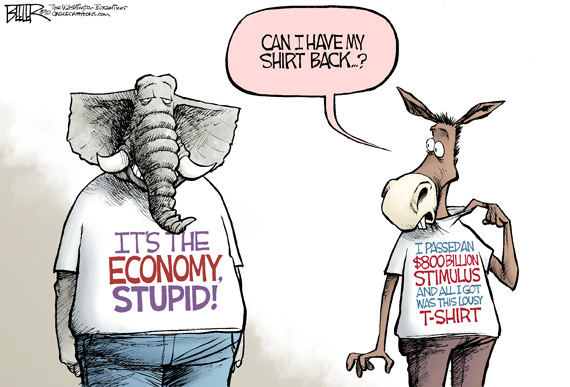
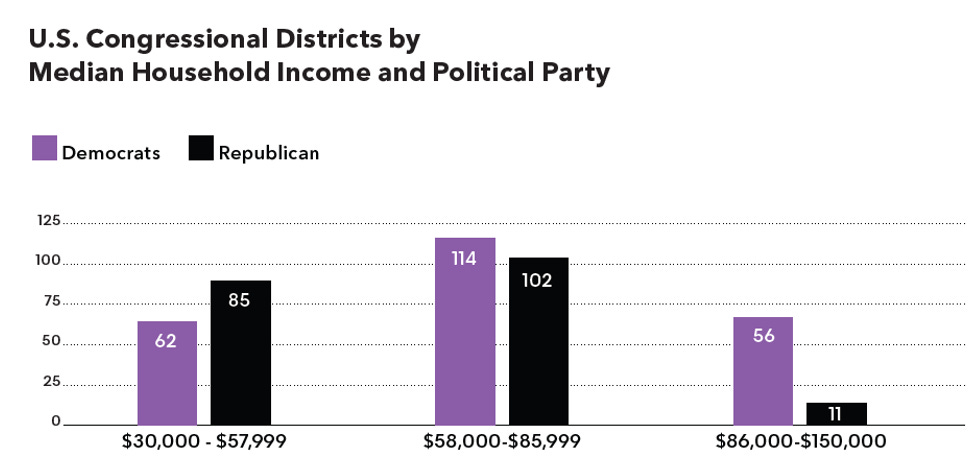
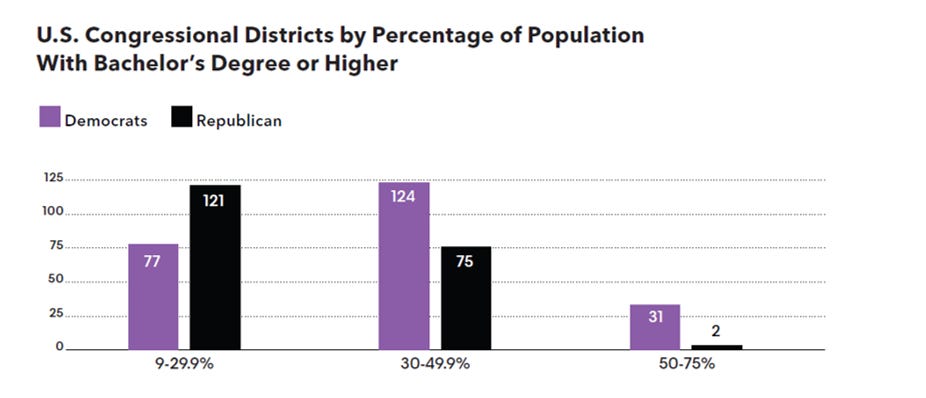
'More educated' in this context does not mean more intelligent. Vast numbers of relatively mediocre college grads make up the 'more educated' cohort. They tend to be employed in areas where their self-interest is favored by government spending - such as education, medicine & government bureaucracy. This does not refute your analysis but merely provides context.
For starters, the Dems could stop calling the other half of the electorate deplorable, racist, white supremacist, misogynist, xenophobes. Wearing condescension like a virtue does not grow their coalition of intolerant woke, urban progressives, over educated green trust-funders, unionized government workers and those entirely deoendant on government handouts.